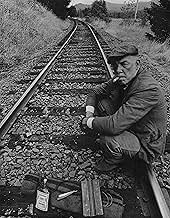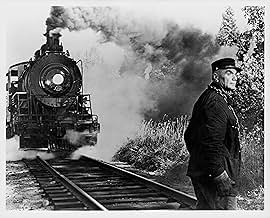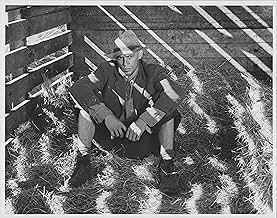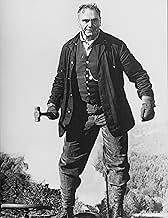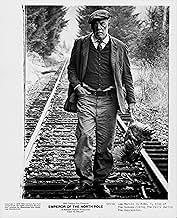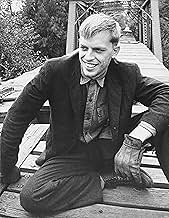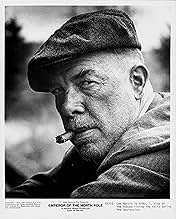Années 30 aux USA. Beaucoup de vagabonds voyagent sur les trains de marchandise pourchassés par les chefs de convoi. Shack, l'un deux, fait en sorte qu'aucun vagabond ne fréquente son convoi... Tout lireAnnées 30 aux USA. Beaucoup de vagabonds voyagent sur les trains de marchandise pourchassés par les chefs de convoi. Shack, l'un deux, fait en sorte qu'aucun vagabond ne fréquente son convoi. Un homme dit "N.1" lui lance un défi.Années 30 aux USA. Beaucoup de vagabonds voyagent sur les trains de marchandise pourchassés par les chefs de convoi. Shack, l'un deux, fait en sorte qu'aucun vagabond ne fréquente son convoi. Un homme dit "N.1" lui lance un défi.
- Réalisation
- Scénario
- Casting principal
- Gray Cat
- (as Elisha Cook)
- Dinger
- (as Joe di Reda)
- Fakir
- (as James Goodwin)
- Preacher
- (as Ray Guth)
Avis à la une
Set during the depression when riding the rails was a way of life for desperate men (and women), the film follows three characters - Lee Marvin, as Number One, a legend among the grizzled hobos congregating along the rail lines; Ernest Borgnine as Shack, the sadistic conductor perfectly willing to do whatever necessary to keep free loaders off his trains; and a young Keith Carradine as Two-Bit, a novice full of bluster and false bravado out to make a name for himself. Marvin takes the kid under his wing; their relationship is part adversarial, as the weary elder tries to educate the fool how to survive on the line. Looming in the background is Borgnine, out to do his job at any cost. Ultimately a wager is made, and Marvin will put his life on the line to best Borgnine and show he is the Emperor of the North.
At times it's a very brutal film - the final confrontation between Marvin & Borgnine is one of the toughest, nastiest fights ever photographed - but it is splendidly made and endlessly fascinating.
Tough hobo Lee Marvin & sadistic conductor Ernest Borgnine meet in the fight of the century , both of whom give excellent performances . Emperor of the North Pole depicts a microcosm of this subculture set in Oregon, and actually used the Oregon, Pacific & Eastern railroad which was taken up in 1994 like so much other trackage around the country. Thus, this motion picture serves as not only a look into an important aspect of American history, but into a specific piece of it in the Pacific Northwest . Interesting and tense screenplay is based in part on the books 'The Road' by Jack London and 'From Coast to Coast with Jack London' . It was Robert Aldrich's intention that the characters played by Ernest Borgnine, Lee Marvin and Keith Carradine represented the Establishment, the Anti-Establishment and the Youth of Today respectively . Nice cinematography by Joseph Biroc reflecting appropriately the 3os and Great Depression , being stunningly filmed in Oregon. Lively and evocative musical score by Frank De Vol , Aldrich's usual, including a wonderful song by Marty Robbins .
Martin Ritt was originally slated to direct but was fired from the production , then Sam Peckinpah was approached next but he couldn't agree with the producers on money. The project was then offered to, and accepted by, Robert Aldrich who gave a tense and brilliant direction . Aldrich began writing and directing for TV series in the early 1950s, and directed his first feature in 1953 (Big Leaguer ,1953). Soon thereafter he established his own production company and produced most of his own films, collaborating in the writing of many of them . Directed in a considerable plethora of genres but almost all of his films contained a subversive undertone . He was an expert on warlike (Dirty Dozen , The Angry Hills , Attack , Ten seconds to hell) and Western (The Frisko kid , Ulzana's raid, Apache , Veracruz , The last sunset) . Raing : Above average , it's a must see and a standout in its genre
Le saviez-vous
- AnecdotesThe title refers to a joke among hobos during the Great Depression that the world's best hobo was Emperor of the North Pole, a way of poking fun at their own desperate situation since somebody ruling over the North Pole would be ruling over a wasteland.
- GaffesThe switch is not thrown for the mail express train to pass by Shack's train as it just enters the junction. In those days, not having the switch thrown would have derailed the mail train.
- Citations
A no. 1: [At the end of the movie, A No. 1 throws Cigaret off of the train, into a pond, and shouts to him from the train] Hey kid you got no class. Hit the bums, kid. Run like the devil. Get a tin can and take up mooching. Knock on back doors for a nickel.
A no. 1: Tell them your story. Make 'em weep. You could have been a meat-eater, kid. But you didn't listen to me when I laid it down.
A no. 1: Stay off the tracks. Forget it. Its a bum's world for a bum. You'll never be Emperor of the North Pole, kid. You had the juice, kid, but not the heart and they go together. You're all gas and no feel, and nobody can teach you that, not even A-No.1. So stay off the train, she'll throw you under for sure. Remember me for that. So long, kid.
- Versions alternativesOriginally premiered as "Emperor of the North Pole": the film was pulled from release because people thought the film was about the Arctic. It was re-released as "Emperor of the North" and given two different advertising campaigns: one with a poster playing up the comedy, another with a poster playing up the violence (The poster said "If you can ride Shack's train and live, you're...Emperor of the North!"). Neither new campaign clicked with audiences. The song "A Man and a Train" is sung in "Emperor of the North" by Marty Robbins. The poster for the original release says it is sung by Bill Medley. It is unknown what other changes, if any, were made between the two releases.
Meilleurs choix
- How long is Emperor of the North?Alimenté par Alexa
Détails
Box-office
- Budget
- 3 705 000 $US (estimé)
- Durée1 heure 58 minutes
- Couleur
- Rapport de forme
- 1.85 : 1
Contribuer à cette page



